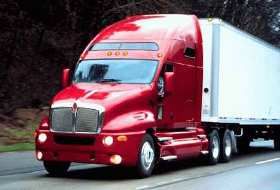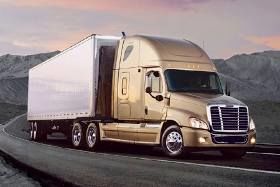Why Aren't Shippers...
Topic 16811 | Page 2
Sue sez:
The problem with shippers is, likr Errol said, theyll try to squeeze every bit of what they "think" they can get away with to try to save on freight costs. Another problem is those who have scales.. They often arent accurate.
If you're close to your load limit, say your BOL says 44,648, the shipper dock should unload you if your request, without argument. Certainly if you get a certified overweight scale ticket and go back to the shipper (talk about PITAs!) they must take off the overload part. I've had to do that.
Maybe the shipper scales aren't accurate. But I bet they're in the ballpark. I use shipper scales on the way out to check my drive & tandem balance. Often the adjustment I make there saves me from buying a re-weigh at the truck stop.
Shipper:
The customer who is shipping the freight. This is where the driver will pick up a load and then deliver it to the receiver or consignee.
Tandem:
Tandem Axles
A set of axles spaced close together, legally defined as more than 40 and less than 96 inches apart by the USDOT. Drivers tend to refer to the tandem axles on their trailer as just "tandems". You might hear a driver say, "I'm 400 pounds overweight on my tandems", referring to his trailer tandems, not his tractor tandems. Tractor tandems are generally just referred to as "drives" which is short for "drive axles".
HOS:
Hours Of Service
HOS refers to the logbook hours of service regulations.Our company expects a CAT scale and its paid for by using our fuel/comdata card so nothing out of pocket or a need to reimburse us. Yes its a PITA, but company policy. The last load was electronic sensors for Chrysler crossdock in Detroit, a whopping 12k lbs so i didnt scale that.
CAT Scale:
A network of over 1,500 certified truck scales across the U.S. and Canada found primarily at truck stops. CAT scales are by far the most trustworthy scales out there.
In fact, CAT Scale offers an unconditional Guarantee:
“If you get an overweight fine from the state after our scale showed your legal, we will immediately check our scale. If our scale is wrong, we will reimburse you for the fine. If our scale is correct, a representative of CAT Scale Company will appear in court with the driver as a witness”

Thanks for the replies. I can see how we are ultimately responsible for the legal weight.
In truck driving and in life nothing grinds my gears morethan being at the mercy of jerks who Don't care.
This shipper was one of those that you do a google search and they have 1/5 stars and you groan while reading the reviews.
NO overnight parking and taking upwards of 4 hours to load(with 30 min sitting at a green light for paperwork) drive 30 miles to the nearest scale find out I'm overweight. So now Go back spend another few hours there and provably having 3-4 hours left to drive with no recourse is such a raw deal. Gah!
Shipper:
The customer who is shipping the freight. This is where the driver will pick up a load and then deliver it to the receiver or consignee.
HOS:
Hours Of Service
HOS refers to the logbook hours of service regulations.Gah!
I believe its GAH!!!!!!


Thanks for the replies. I can see how we are ultimately responsible for the legal weight.
In truck driving and in life nothing grinds my gears morethan being at the mercy of jerks who Don't care.
This shipper was one of those that you do a google search and they have 1/5 stars and you groan while reading the reviews.
NO overnight parking and taking upwards of 4 hours to load(with 30 min sitting at a green light for paperwork) drive 30 miles to the nearest scale find out I'm overweight. So now Go back spend another few hours there and provably having 3-4 hours left to drive with no recourse is such a raw deal. Gah!
Isaac...raw deals will happen in the trucking industry. Just turn the page and start again tomorrow. I had a load just before I left Roehl that weighed 80100 lbs...scaled out at the shipper at 79860 lbs...the key was..the driver had to go into the scale house to get the ticket...lol. I told dispatch that the load would be legal if the driver took better care of himself. Good luck. Find out what your truck weighs empty (whether it's a dry van or reefer). It may help you when you get in these situations again.
Shipper:
The customer who is shipping the freight. This is where the driver will pick up a load and then deliver it to the receiver or consignee.
Dry Van:
A trailer or truck that that requires no special attention, such as refrigeration, that hauls regular palletted, boxed, or floor-loaded freight. The most common type of trailer in trucking.Reefer:
A refrigerated trailer.
HOS:
Hours Of Service
HOS refers to the logbook hours of service regulations.
Thanks for the replies. I can see how we are ultimately responsible for the legal weight.
In truck driving and in life nothing grinds my gears morethan being at the mercy of jerks who Don't care.
This shipper was one of those that you do a google search and they have 1/5 stars and you groan while reading the reviews.
NO overnight parking and taking upwards of 4 hours to load(with 30 min sitting at a green light for paperwork) drive 30 miles to the nearest scale find out I'm overweight. So now Go back spend another few hours there and provably having 3-4 hours left to drive with no recourse is such a raw deal. Gah!
Isaac...raw deals will happen in the trucking industry. Just turn the page and start again tomorrow. I had a load just before I left Roehl that weighed 80100 lbs...scaled out at the shipper at 79860 lbs...the key was..the driver had to go into the scale house to get the ticket...lol. I told dispatch that the load would be legal if the driver took better care of himself. Good luck. Find out what your truck weighs empty (whether it's a dry van or reefer). It may help you when you get in these situations again.
I've hauled a few loads like that. The trick is to look at the state's your going thru. Most state's have a 500lb so epu/apu exemption. So I always make sure if I'm heavy I put the extra on my drives. Kentucky and Rhode island are the only 2 states that I drive thru that don't allow the exemption.
Shipper:
The customer who is shipping the freight. This is where the driver will pick up a load and then deliver it to the receiver or consignee.
Dry Van:
A trailer or truck that that requires no special attention, such as refrigeration, that hauls regular palletted, boxed, or floor-loaded freight. The most common type of trailer in trucking.Reefer:
A refrigerated trailer.
HOS:
Hours Of Service
HOS refers to the logbook hours of service regulations.APU:
Auxiliary Power Unit
On tractor trailers, and APU is a small diesel engine that powers a heat and air conditioning unit while charging the truck's main batteries at the same time. This allows the driver to remain comfortable in the cab and have access to electric power without running the main truck engine.
Having an APU helps save money in fuel costs and saves wear and tear on the main engine, though they tend to be expensive to install and maintain. Therefore only a very small percentage of the trucks on the road today come equipped with an APU.

EPU:
Electric Auxiliary Power Units
Electric APUs have started gaining acceptance. These electric APUs use battery packs instead of the diesel engine on traditional APUs as a source of power. The APU's battery pack is charged when the truck is in motion. When the truck is idle, the stored energy in the battery pack is then used to power an air conditioner, heater, and other devices

I scale any load that shows up as 30,000lbs or more.on the bols.
Also, remember when looking at your bol that you want the total weight. Sometimes they may list the weight of the cargo and the weight of the pallets separately. You want to make sure you look for that and get the weight of the cargo and pallets.
A blue chep pallet weights about 100 lbs . 24 of those on your truck adds upwards of 2400 lbs. Not much by themselves, but when you have a bol that says 43000lbs, you want to make sure that's with pallets included.
HOS:
Hours Of Service
HOS refers to the logbook hours of service regulations.We had a shipper "like that" once lol. It was a load of cardboard scrap supposed to go to the IP mill in Cedar Rapids. It wasnt a priority load because they had too much there already. We arrive and they are all ****y because "we" are 2 days late lol. I told them, "gee, im sorry but we arent late for anything. We were in Denver last night and was just assigned this load about an hour ago. The cedar mill hasnt been accepting scrap for the last 3 days."
They had placed these bales outside for 2 days and there had been severe storms. Needless to say we knew they would weigh much more than we could carry. They had no scale since theirs was under about 5' of water. We drove about 15 miles to the closest scale.. We were at about 85k lbs. We go back with the scale tickets where they wanted to argue about how the weight wasnt that much. They took off 2 bales.. We requested they take off 4. Back to the CAT scale 2 more times removing 1 bale each trip.
I had already notified our DM of the situation and we got paid quite well for the shippers shenanigans, which IP billed them for. Detention pay from the first arrival until the final legal scale was billed to that shipper by the cedar mill plus an extra $100 for our inconvenience.. Oh and the miles back and forth to the scale also.
IP takes care of us because we take care of them. Theyll often pay our company to shuttle our empty trailers where IP wants them located for their needs.
Shipper:
The customer who is shipping the freight. This is where the driver will pick up a load and then deliver it to the receiver or consignee.
Dm:
Dispatcher, Fleet Manager, Driver Manager
The primary person a driver communicates with at his/her company. A dispatcher can play many roles, depending on the company's structure. Dispatchers may assign freight, file requests for home time, relay messages between the driver and management, inform customer service of any delays, change appointment times, and report information to the load planners.CAT Scale:
A network of over 1,500 certified truck scales across the U.S. and Canada found primarily at truck stops. CAT scales are by far the most trustworthy scales out there.
In fact, CAT Scale offers an unconditional Guarantee:
“If you get an overweight fine from the state after our scale showed your legal, we will immediately check our scale. If our scale is wrong, we will reimburse you for the fine. If our scale is correct, a representative of CAT Scale Company will appear in court with the driver as a witness”

Also keep in mind - that shippers will try to stuff EVERY LAST POUND OF PRODUCT in your box they can. Goes especially for large DC type orders - where you're not the only truckload of that product going to that recipient. The water companies are FAMOUS for trying to stuff an extra pallet of 16 oz bottled water in your box.
I see this a lot down on the port where I've done work as a longshoreman. The union gets a cut of TONNAGE on containers. The BOL for any given container is almost always off, as the shipper tries to beat the shipping company out of $$ on the shipping cost. Gross is supposed to be chalked on the side of the container - at the shipping port, they do it by the declared weight on the BOL (which is how it goes on the shippers computer). The container cranes have scales built-in - so the operator compares the declared weight, to the ACTUAL WEIGHT - and the longshoreman invoice for the ACTUAL TONNAGE MOVED, not the declared. But the INTERMODAL DRIVER that moves that box off the port - may end up getting jammed up for a container that weighs 1,000's of lbs more than declared weight, when he rolls across a scale with it.
Rick
Wow! Corruption and cheating in the freight business, and setting it up so the little guy takes the heat. Whoda thunk it?
Shipper:
The customer who is shipping the freight. This is where the driver will pick up a load and then deliver it to the receiver or consignee.
Intermodal:
Transporting freight using two or more transportation modes. An example would be freight that is moved by truck from the shipper's dock to the rail yard, then placed on a train to the next rail yard, and finally returned to a truck for delivery to the receiving customer.
In trucking when you hear someone refer to an intermodal job they're normally talking about hauling shipping containers to and from the shipyards and railyards.
New Reply:
New! Check out our help videos for a better understanding of our forum features

















Preview:
This topic has the following tags:
Advice For New Truck Drivers Driver Responsibilities Truck Stops







 TT On Facebook
TT On Facebook
Forgot to add.. Slightly too heavy on the front after all tandem or 5th wheel adjustments but not over gross? Back up and slam on the brakes. This has saved me many a trip back to a shipper. If im over gross at a CAT scale , ill get the ok to top off my fuel and THEN take it back to the shipper to have them take off product.
If you have a truck with an APU exemption on your tractor, make sure you have proof of the exemption IN YOUR PERMIT BOIK to save on possible hassels.
Shipper:
The customer who is shipping the freight. This is where the driver will pick up a load and then deliver it to the receiver or consignee.
Tandem:
Tandem Axles
A set of axles spaced close together, legally defined as more than 40 and less than 96 inches apart by the USDOT. Drivers tend to refer to the tandem axles on their trailer as just "tandems". You might hear a driver say, "I'm 400 pounds overweight on my tandems", referring to his trailer tandems, not his tractor tandems. Tractor tandems are generally just referred to as "drives" which is short for "drive axles".
CAT Scale:
A network of over 1,500 certified truck scales across the U.S. and Canada found primarily at truck stops. CAT scales are by far the most trustworthy scales out there.
In fact, CAT Scale offers an unconditional Guarantee:
“If you get an overweight fine from the state after our scale showed your legal, we will immediately check our scale. If our scale is wrong, we will reimburse you for the fine. If our scale is correct, a representative of CAT Scale Company will appear in court with the driver as a witness”
APU:
Auxiliary Power Unit
On tractor trailers, and APU is a small diesel engine that powers a heat and air conditioning unit while charging the truck's main batteries at the same time. This allows the driver to remain comfortable in the cab and have access to electric power without running the main truck engine.
Having an APU helps save money in fuel costs and saves wear and tear on the main engine, though they tend to be expensive to install and maintain. Therefore only a very small percentage of the trucks on the road today come equipped with an APU.